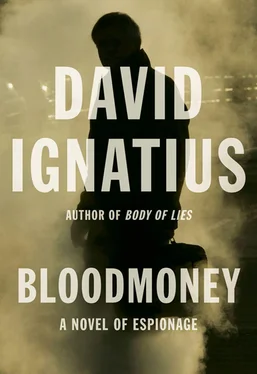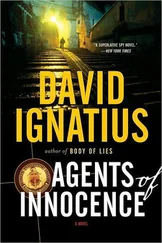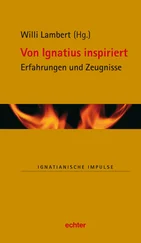David Ignatius - Bloodmoney
Здесь есть возможность читать онлайн «David Ignatius - Bloodmoney» весь текст электронной книги совершенно бесплатно (целиком полную версию без сокращений). В некоторых случаях можно слушать аудио, скачать через торрент в формате fb2 и присутствует краткое содержание. Жанр: Шпионский детектив, на английском языке. Описание произведения, (предисловие) а так же отзывы посетителей доступны на портале библиотеки ЛибКат.
- Название:Bloodmoney
- Автор:
- Жанр:
- Год:неизвестен
- ISBN:нет данных
- Рейтинг книги:4 / 5. Голосов: 1
-
Избранное:Добавить в избранное
- Отзывы:
-
Ваша оценка:
- 80
- 1
- 2
- 3
- 4
- 5
Bloodmoney: краткое содержание, описание и аннотация
Предлагаем к чтению аннотацию, описание, краткое содержание или предисловие (зависит от того, что написал сам автор книги «Bloodmoney»). Если вы не нашли необходимую информацию о книге — напишите в комментариях, мы постараемся отыскать её.
Bloodmoney — читать онлайн бесплатно полную книгу (весь текст) целиком
Ниже представлен текст книги, разбитый по страницам. Система сохранения места последней прочитанной страницы, позволяет с удобством читать онлайн бесплатно книгу «Bloodmoney», без необходимости каждый раз заново искать на чём Вы остановились. Поставьте закладку, и сможете в любой момент перейти на страницу, на которой закончили чтение.
Интервал:
Закладка:
37
From the turreted windows of the members’ lounge at the Karachi Boat Club at dusk, the light on Chinna Creek was a tawny pink. Dr. Omar was visiting one of his university colleagues, a man from one of the “good families” of this merchant city, who wanted to show off the old club. On the walls were yellowing photographs of the first regatta in 1881 and the early boat races against Calcutta, Madras and the other metropoles of the Raj. The people in these old photographs were all white-skinned Anglo-Saxons, the men in blazers and white duck trousers, the women “memsahibs” in enormous hats and lacy white dresses. There was not a dark face among them, but that didn’t seem to bother the present-day members. They drank their gin and tonics and whiskeys and celebrated the lost world from which their ancestors had been so systematically excluded.
Dr. Omar was drinking nothing stronger than a Coca-Cola this evening. When he traveled to conferences abroad and wine was poured, he usually had a sip to be polite. He did not make a fuss about halal meat, either, the way some Muslims did. It was part of being a modern man, he liked to say, of living in the present.
Revenge comes in different flavors. Sometimes it is a swift act of rage that shatters the mask the oppressor has created for you. Other times it is a slow process in which the mask is an essential shield to cover actions that the oppressor could not imagine. Sometimes with a disciplined man, the act of revenge is all but invisible.
The professor did not appear to be angry; he was a protean figure who could assume whatever disposition suited the needs of the moment. That was one reason people rarely questioned his activities. He was an elusive personality, cleverer than his fellows. Since he was a boy, he had been off somewhere else, doing things that others knew they wouldn’t understand, even if they tried.
The host asked Omar about the new research contract he had received from a European computer-security company. The professor explained modestly that he was only a small subcontractor: He had given a paper nearly a decade ago at a conference in London on encrypted search algorithms, and such papers had brought him a steady trickle of work ever since, enough to pay his bills.
It was almost dark now on the water. The last of the sculls was being hauled up into the boathouse. Across the creek were the dense man-groves of the low water shoals, and beyond in the last light of the evening the dark aquamarine waters of the Arabian Sea, stretching west to Oman and then the world.
Dr. Omar’s friend asked if he should buy shares in the one of the Indian IT companies that was now a big software vendor in the subcontinent, and the professor replied no, it was not a wise investment. The future was not in boxed software, but in the “cloud,” the applications that would be available on the Internet to all, even in South Asia. He suggested several American companies that would be better bets.
“The financial markets are treacherous,” said Dr. Omar. “I was just reading today in the Financial Times online that one of the big hedge funds in London may go under. Alphabet Capital, it was. Solid as a rock, people said. Had investors here in Pakistan, too, I believe. But it turned out to be rotten underneath. Fraud investigation and all that, CEO arrested, horrible mess. Not really a surprise. They are too fancy in the West; too clever for their own good.”
“Good advice, old boy,” said the host. And a jolly nice evening, too, and time for another whiskey. But Dr. Omar had to excuse himself. He was working part of this summer term at Bahria University, near the club, as an adjunct professor of computer science. He had come from Islamabad a few days before, and he had a bit more work to do that night at the lab. As he left the members’ lounge, he admired the old photographs and memorabilia once more, the shots of men in flannel shorts holding their oars, and of men and women bathing together in the creek, before the water became polluted and the culture was transformed.
Traditions mattered, said Dr. Omar’s friend, and the professor agreed that it was so.
Dr. Omar was tired. He did not like to admit that to his friend at the club, or to anyone, but it was a fact. He was a boat that was always moving against the tide. He had struggled as a boy to escape the flow of his tribal world, and to find a new set of connections in the West. And he had succeeded, visibly and invisibly. But once those attachments had become firm-visits and conferences and briefings-an event had taken place that compelled him to paddle back toward home, this time entirely in secret. He was never at home, even when he was at home. There was no place that was comfortable or safe.
The professor did not believe in permanent revenge, or in the permanence of anything that involved mortal beings. He had asked himself when it would be time to stop: How much blood would be enough? That was something his father had never explained when he talked about the tribal code. It was measure for measure, but how could you calculate the weight of an insult, or the commensurate volumes of honor and fear?
When he had seen the television footage of the American woman at the hospital in Islamabad, the face of someone he had intended to kill, soothing a Pakistani widow, he had thought: Perhaps it is time. But vengeance is a heavy weight, and the momentum of the thing had carried him forward.
Omar thought of his sister, the sole surviving member of his blood family, who was living in Peshawar. She had a son named Rashid who was now eleven years old. Omar had visited him six months ago, and brought him a small computer as a gift. The boy had pleaded for him to come back, but it was too dangerous to go more often. Too many people were curious about him, and he had worked so hard to erase his past.
It had been uncanny, but on that last trip to Peshawar, his young nephew had asked to play number games.
“I know all the perfect numbers,” the boy had said. “Six, twenty-eight, four hundred ninety-six, eight thousand one hundred twenty-eight.”
“Very good,” Dr. Omar had said. “You are a bright boy.”
“I know the prime numbers, too,” the boy had boasted. “Two, three, five, seven, eleven, thirteen, seventeen-”
“Those are too easy. Tell me the primes over one hundred.”
“One hundred one, one hundred three, one hundred seven, one hundred nine, one hundred thirteen.”
“Bahadur!” Omar had exclaimed, which means brave man. “Over five hundred.”
“Five hundred three, five hundred nine, five hundred twenty-one, five hundred twenty-three…”
“ W’Allah! ” Omar had said, patting the boy on the head. As he listened to the numbers spilling out, he had felt himself falling through time. He had rung that same scale as a boy, saying the primes out loud to himself because his father couldn’t understand. This boy Rashid would not be caught between two worlds: He would live only in one.
And Omar had thought to himself that day as he finished his visit to his sister’s home and said his goodbyes: Perhaps we have come to the end. Perhaps this is the balance.
Dr. Omar walked to the university compound, a half mile from the Boat Club. He passed the cantonment where the senior naval officers had their residences, and then entered the gate of Bahria, which was itself a creation of the navy establishment. The naval engineers had been interested in Dr. Omar’s work, like so many others. The porter waved him through the gate and he climbed the stairs to his office, which overlooked a lawn that had faded to a sickly lime-green in the summer heat.
He turned on his computer and checked his mail, account by account. The computer he was using at Bahria was a university machine whose IP address had no connection with him. The professor had nearly a dozen email identities, each with a different name and set of secrets. Near the end of this session, he visited a Yahoo account that he checked daily on the chance it might contain a new bit of information.
Читать дальшеИнтервал:
Закладка:
Похожие книги на «Bloodmoney»
Представляем Вашему вниманию похожие книги на «Bloodmoney» списком для выбора. Мы отобрали схожую по названию и смыслу литературу в надежде предоставить читателям больше вариантов отыскать новые, интересные, ещё непрочитанные произведения.
Обсуждение, отзывы о книге «Bloodmoney» и просто собственные мнения читателей. Оставьте ваши комментарии, напишите, что Вы думаете о произведении, его смысле или главных героях. Укажите что конкретно понравилось, а что нет, и почему Вы так считаете.












